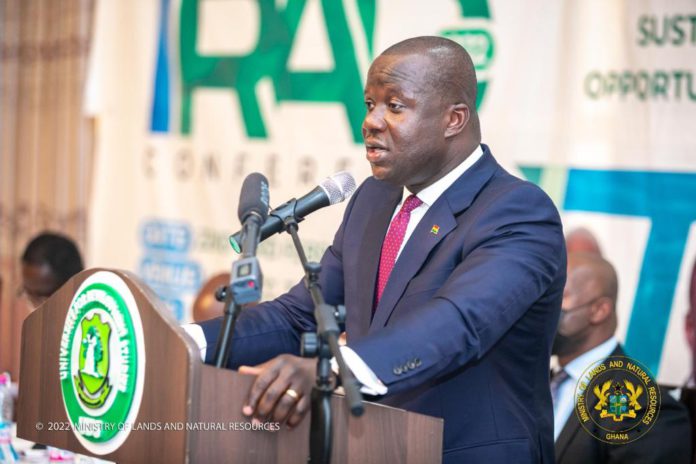Investors are currently undertaking about 500 mineral exploration projects in the country, mainly targeted at gold, lithium, copper and cobalt.
The Minister of Lands and Natural Resources, Samuel Abu Jinapor, who made this known, said recent geological investigations had also indicated viable prospects for iron ore, nickel, zinc, chromium, lead and columbite-tantalite.
Mr Jinapor said the exploration activities were part of the government’s renewed focus to build a robust mining sector with diversified mineral portfolio.
The Damongo Member of Parliament (MP), who first made the call at the Ghana Day event at the China Mining Conference and Exhibition (CMCE) at Tianjin in China last month, called on multinational mining companies to invest in the mining value chain, bearing in mind the government’s priority on value addition.
He told the Daily Graphic in a subsequent interview that this would ensure that those resources were harnessed for national development.
The event in China was organised to showcase the country’s huge mineral potential to the world, with the view to attracting strategic investors.
Gold
Touching on gold, the minister said the long-held belief that gold was found only at the coastal and forest zones of the country was a thing of the past as commercial deposits of the precious mineral had been discovered across the country.
“As I speak, Shandong Gold Group, through its local subsidiary, Cardinal Namdini, is engaged in large-scale mining in the northern part of the country, and it is expected to become the third largest mine in the country once production starts in the last quarter of next year,” he said.
Mr Jinapor added that currently, there were some 16 large-scale mining operations in the country, with 14 of them producing gold, and the other two producing manganese and bauxite.
He also said a lithium mine would soon commence operation, subject to parliamentary ratification.
“These mines are operated by different companies, including companies with significant Chinese interest, such as Shandong Gold Group’s Cardinal Namdini, Chifeng Jilong Gold Group’s Golden Star Resources, and Ningxia Tianyuan Manganese Industry Group,” he said.
The minister added that 235 companies offering engineering and mine support services such as drilling, contract mining and assaying services were supporting the large-scale companies.
Bauxite
Mr Jinapor added that Ghana had an estimated bauxite resource base of 900 million tonnes, with the potential to produce in excess of 10 million tonnes per year.
He said it was unfortunate that despite that potential, there was only one bauxite mine, operated by the Ghana Bauxite Company, currently a joint venture between the government and a Ghanaian investor.
“We are producing just a little over one million tonnes per year.
With the right partnership and investment, the company can produce in excess of five million tonnes annually,” he said.
Mr Jinapor also stressed that apart from gold, Ghana was endowed with several other minerals, including diamonds, and some of the critical minerals required for the green energy transition such as lithium, iron ore, graphite and manganese.
He said there were also deposits of base metals such as copper, zinc, nickel, chrome and lead, as well as industrial minerals such as sand, gravel, granites and salt.
The Minister said the government would continue to pursue the right technology and innovation for the exploitation of those minerals.
“The priority of the government continues to be the translation of these volumes of mineral production into wealth to benefit all stakeholders equitably, including the larger populace, as optimally as possible,” he said.
Assurance
The Minister assured investors that the government was mindful of the need to implement mining-friendly policies to sustain those achievements while ensuring environmental sustainability and protecting the interest of citizens and investors.
“Fortunately, and significantly, in Ghana, the rule of law is the norm and not the exception.
It is the pivot around which our governance architecture revolves,” he said.
He added that with a stable governance system, spanning over 30 years, investors were assured of the protection of their rights.
The minister also said the government was focused on creating a business-friendly environment and adopting policies to improve transparency in the industry.
“Our policy and legislative reforms are geared towards efficient exploitation, value addition, environmental protection, local content and local participation, and effective utilisation of our mineral resources for the benefit of Ghanaians and investors,” he said.
Mr Jinapor said the Ghana Integrated Aluminium Development Corporation (GIADEC), the statutory corporation responsible for the promotion and development of the integrated aluminium industry in the country, was currently engaging private sector investors for bauxite mining and refining into alumina.
Again, he said, the cooperation was also working to get a strategic partner for the Volta Aluminium Company Ltd (VALCO).
The minister added that the Ghana Integrated Iron and Steel Development Corporation (GIISDEC) was engaging investors for the exploitation of over 1.5 billion tonnes of iron ore, with an average grade of 40 per cent iron oxide, to build an integrated iron and steel industry in the country.
With global automotive giants such as the Chinese state-owned Sinotruk, Toyota, Nissan, Volkswagen, and Suzuki all established in Ghana, the iron and steel industry presents a huge investment opportunity to feed Ghana’s automotive industry,” he said.
Background
Till date, gold remains Ghana’s main mineral resource, accounting for more than 90 per cent of the country’s gross mineral revenues.
Ghana is currently the leading producer of gold on the African continent.
China has been Ghana’s biggest trading partner, with trade value reaching US$7.46 billion in 2019, the largest investor in Ghana by registered projects, and a great ally in economic, financial and infrastructural development.
In 2019 alone, prior to the pandemic, over 10,500 Chinese entered Ghana, with an estimated 22,000 Ghanaians visiting China that same year.
ALSO READ:

